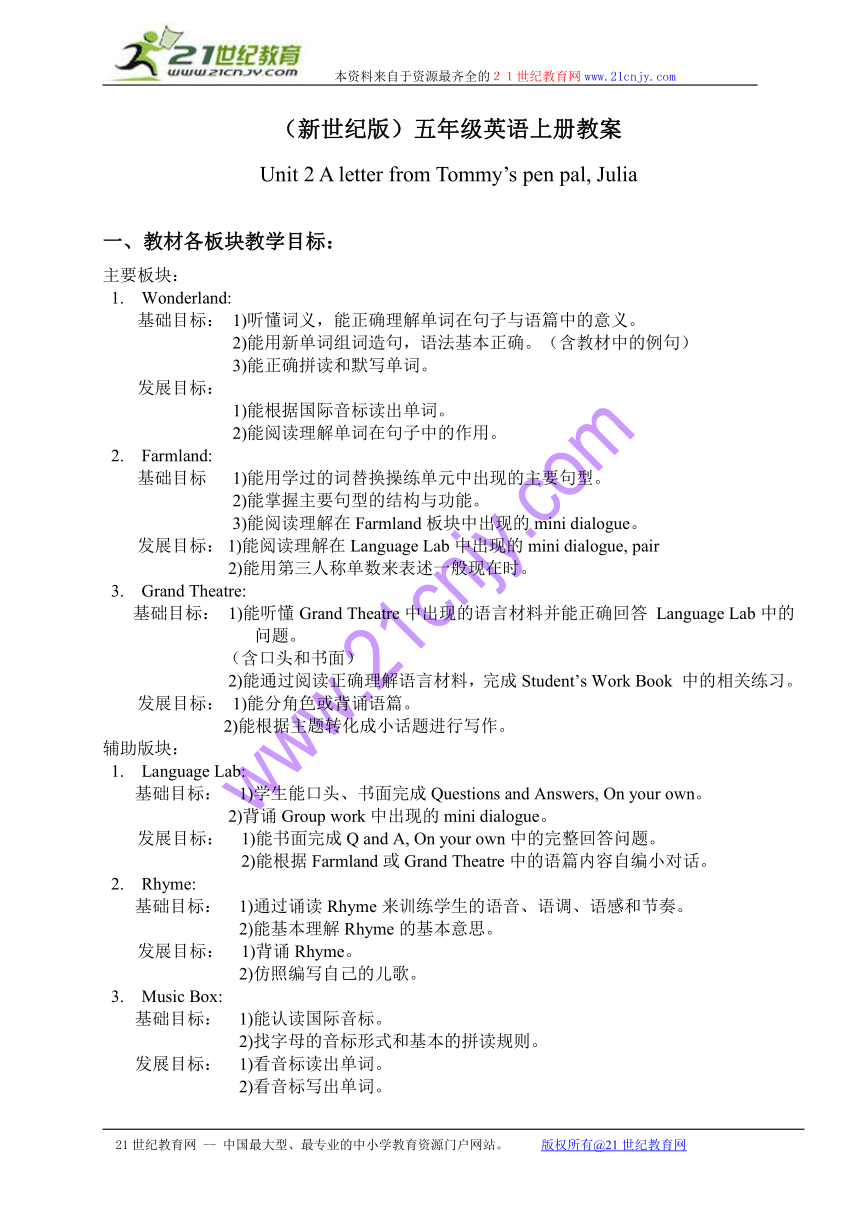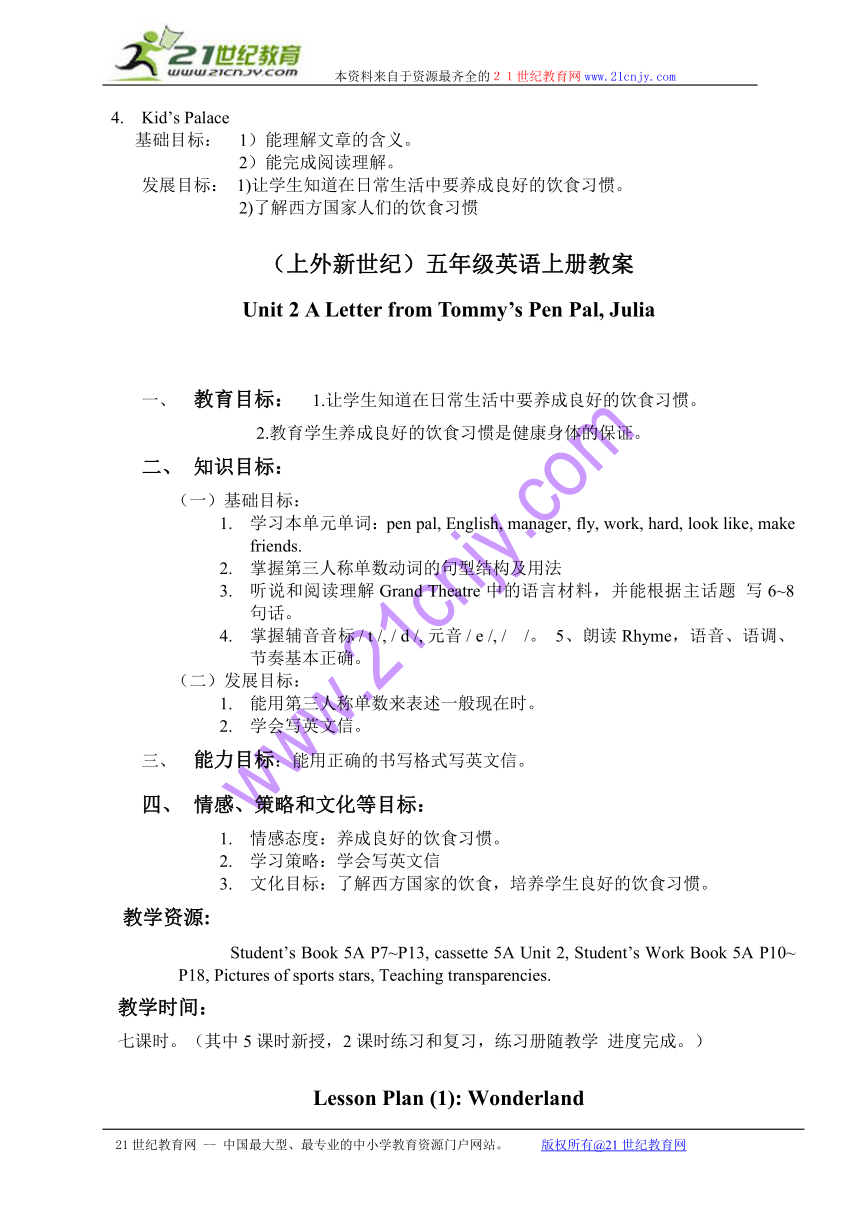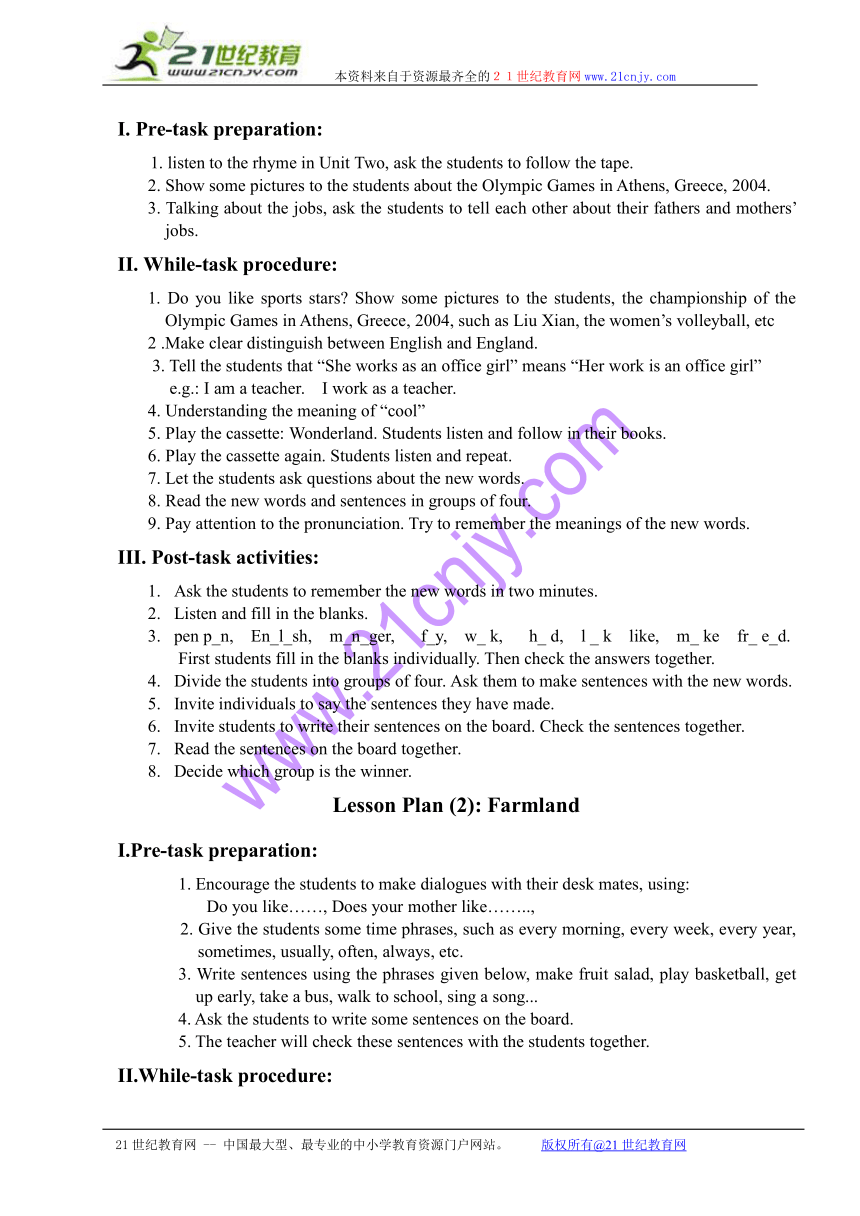五年级英语上册教案 Unit 2(新世纪版)
文档属性
| 名称 | 五年级英语上册教案 Unit 2(新世纪版) |

|
|
| 格式 | rar | ||
| 文件大小 | 18.3KB | ||
| 资源类型 | 教案 | ||
| 版本资源 | 新世纪版 | ||
| 科目 | 英语 | ||
| 更新时间 | 2014-02-21 00:00:00 | ||
图片预览



文档简介
本资料来自于资源最齐全的21世纪教育网www.21cnjy.com
(新世纪版)五年级英语上册教案
Unit 2 A letter from Tommy’s pen pal, Julia
一、教材各板块教学目标:
主要板块:
1. Wonderland:
基础目标: 1)听懂词义,能正确理解单词在句子与语篇中的意义。
2)能用新单词组词造句,语法基本正确。(含教材中的例句)
3)能正确拼读和默写单词。
发展目标:
1)能根据国际音标读出单词。
2)能阅读理解单词在句子中的作用。
2. Farmland:
基础目标 1)能用学过的词替换操练单元中出现的主要句型。
2)能掌握主要句型的结构与功能。
3)能阅读理解在Farmland板块中出现的mini dialogue。
发展目标: 1)能阅读理解在Language Lab中出现的mini dialogue, pair
2)能用第三人称单数来表述一般现在时。
3. Grand Theatre:
基础目标: 1)能听懂Grand Theatre中出现的语言材料并能正确回答 Language Lab 中的问题。
(含口头和书面)
2)能通过阅读正确理解语言材料,完成Student’s Work Book 中的相关练习。
发展目标: 1)能分角色或背诵语篇。
2)能根据主题转化成小话题进行写作。
辅助版块:
1. Language Lab:
基础目标: 1)学生能口头、书面完成Questions and Answers, On your own。
2)背诵Group work中出现的mini dialogue。
发展目标: 1)能书面完成Q and A, On your own中的完整回答问题。
2)能根据Farmland或Grand Theatre中的语篇内容自编小对话。
2. Rhyme:
基础目标: 1)通过诵读Rhyme来训练学生的语音、语调、语感和节奏。
2)能基本理解Rhyme的基本意思。
发展目标: 1)背诵Rhyme。
2)仿照编写自己的儿歌。
3. Music Box:
基础目标: 1)能认读国际音标。
2)找字母的音标形式和基本的拼读规则。
发展目标: 1)看音标读出单词。
2)看音标写出单词。
4. Kid’s Palace
基础目标: 1)能理解文章的含义。
2)能完成阅读理解。
发展目标: 1)让学生知道在日常生活中要养成良好的饮食习惯。
2)了解西方国家人们的饮食习惯
(上外新世纪)五年级英语上册教案
Unit 2 A Letter from Tommy’s Pen Pal, Julia
1、 教育目标: 1.让学生知道在日常生活中要养成良好的饮食习惯。
2.教育学生养成良好的饮食习惯是健康身体的保证。
2、 知识目标:
(1) 基础目标:
1. 学习本单元单词:pen pal, English, manager, fly, work, hard, look like, make friends.
2. 掌握第三人称单数动词的句型结构及用法
3. 听说和阅读理解Grand Theatre 中的语言材料,并能根据主话题 写6~8句话。
4. 掌握辅音音标 / t /, / d /, 元音 / e /, / /。 5、朗读Rhyme,语音、语调、节奏基本正确。
(2) 发展目标:
1. 能用第三人称单数来表述一般现在时。
2. 学会写英文信。
3、 能力目标:能用正确的书写格式写英文信。
4、 情感、策略和文化等目标:
1. 情感态度:养成良好的饮食习惯。
2. 学习策略:学会写英文信
3. 文化目标:了解西方国家的饮食,培养学生良好的饮食习惯。
教学资源:
Student’s Book 5A P7~P13, cassette 5A Unit 2, Student’s Work Book 5A P10~P18, Pictures of sports stars, Teaching transparencies.
教学时间:
七课时。(其中5课时新授,2课时练习和复习,练习册随教学 进度完成。)
Lesson Plan (1): Wonderland
I. Pre-task preparation:
1. listen to the rhyme in Unit Two, ask the students to follow the tape.
2. Show some pictures to the students about the Olympic Games in Athens, Greece, 2004.
3. Talking about the jobs, ask the students to tell each other about their fathers and mothers’ jobs.
II. While-task procedure:
1. Do you like sports stars Show some pictures to the students, the championship of the Olympic Games in Athens, Greece, 2004, such as Liu Xian, the women’s volleyball, etc
2 .Make clear distinguish between English and England.
3. Tell the students that “She works as an office girl” means “Her work is an office girl”
e.g.: I am a teacher. I work as a teacher.
4. Understanding the meaning of “cool”
5. Play the cassette: Wonderland. Students listen and follow in their books.
6. Play the cassette again. Students listen and repeat.
7. Let the students ask questions about the new words.
8. Read the new words and sentences in groups of four.
9. Pay attention to the pronunciation. Try to remember the meanings of the new words.
III. Post-task activities:
1. Ask the students to remember the new words in two minutes.
2. Listen and fill in the blanks.
3. pen p_n, En_l_sh, m_n_ger, f_y, w_ k, h_ d, l _ k like, m_ ke fr_ e_d.
First students fill in the blanks individually. Then check the answers together.
4. Divide the students into groups of four. Ask them to make sentences with the new words.
5. Invite individuals to say the sentences they have made.
6. Invite students to write their sentences on the board. Check the sentences together.
7. Read the sentences on the board together.
8. Decide which group is the winner.
Lesson Plan (2): Farmland
I.Pre-task preparation:
1. Encourage the students to make dialogues with their desk mates, using:
Do you like……, Does your mother like……..,
2. Give the students some time phrases, such as every morning, every week, every year, sometimes, usually, often, always, etc.
3. Write sentences using the phrases given below, make fruit salad, play basketball, get up early, take a bus, walk to school, sing a song...
4. Ask the students to write some sentences on the board.
5. The teacher will check these sentences with the students together.
II.While-task procedure:
1. Ask: Do you like riding Do you go to school by bus or by bicycle What about your father and mother Don’t you think it’s very cool to ride a bicycle
2. Play the cassette: Every Day. Students listen and follow in their books.
3. Play the cassette again. Students listen and repeat.
Ask: Can you ride to school Why
4. Encourage the students to say the reason.
5. Divide the students into groups. Encourage them to think of the reason. Why primary school students mustn’t ride a bicycle to school
III. Post-task activities:
1. Invite pairs of students to act in front of the class. Encourage more able students to use their own words
2. Try to find the mistakes and correct them. Give some help if they need.
3. Ask the students to practice and act the mini dialogue in pairs.
Lesson Plan (3): Grand Theatre
I.Pre-task preparation:
1. Say a chant.
2. Ask the students to say something about their families, the more the better.
3. Make a short dialogue about their families.
4. Ask some pairs to act in front of the class.
II.While-task procedure:
1. Play the cassette: A letter from Tommy’s Pen Pal, Julia.
2. Ask the students to look at the right corner of the page. What do these words means
3. Tell the students the right form of a letter.
4. Invite some students to read the letter.
5. Ask the students to write a letter to their friends or relatives.
III.Post-task activities:
1. Student’s Work Book Page 14,
a. Students work in pairs to complete the sentences orally.
b. Invite individual student to read the sentences
c. Students write the missing words individually.
d. Invite students to write their sentences on the board.
d. Students make a short play in groups and then act in front of the class
2. Student’s Work Book Page 15
a. Complete the dialogue in groups.
b. Fill in the missing words
c. Act out the dialogue.
Lesson Plan (4): Disneyland
I. Pre-task preparation:
1. Ask some students to read their letters to the class.
2. Students listen to the rhyme and repeat.
II. While-task procedure:
1. Show the students a picture about how to introduce a new person.
2. Play the cassette: Group work on Page 11. Students listen and follow in their books.
3. Play the cassette again. Students listen and repeat.
4. Give pairs of students a few minutes to practice the dialogue.
5.Divide students into groups. Ask them to practice and act the dialogue. Encourage the more able
Students to replace the items in the dialogue with other pictures.
6. Invite groups to act the dialogue in front of the class.
7. Students listen and fill in the blanks:
(Words on page 16 in Music Box) Learn the phonetics.
8. Write the phonetics on the board. Ask individuals to read them.
9. Play the cassette: Rhyme. Students listen and follow in their books.
10. Play the cassette again. Students listen and repeat.
11. Invite individual students to read the rhyme.
12. Have the students to understand the Chinese meaning of the rhyme.
III.Post-task activities:
1. Student’s Work Book Page 10, 11.
a. Play the cassette. Students listen and choose the right answer.
b. Students finish the exercises individually.
c. Ask the students to read the sentences with the tape and check the answers.
2. Student’s Work Book Page 12, 13.
a. Students listen and fill in the blanks.
b. Invite individual students to read the words and sentences.
c. Invite individual students to write the answers on the board. The rest of the class check the
Answers.
d. Ask the whole class to read the words and sentences together.
Lesson Plan (5): Kid’s Palace
I. Pre-task preparation:
1. Ask the students about their eating habits.
2. Let the students talk about their favorite food.
II. While-task procedure:
1. Show the students some pictures about McDonald’s and Kentucky Fried Chicken.
2. Do you like McDonald’s and Kentucky Fried Chicken
3. What do most people eat in western countries (Breakfast, lunch, supper)
4. Play the cassette: Students listen and follow in their books.
5. Play the cassette again. Students listen and repeat.
6. Ask some of them to read the passage.
7. Divide the students into groups. Ask them to discuss the
Passage. Encourage the more able
Students to say something about the good eating habits, what we should eat every day
What we should not eat too much
8. The teacher may ask some questions on the passage.
9. Read and match.
III.Post-task activities:
1. Student’s Work Book Page 17,
a. Read the passage and answer the questions.
b. Students finish the exercises individually.
2. Student’s Work Book Page 18
a. Who is your best friend
b. When does your friend got school, go to bed, do his homework, etc
c. Write something about one of your friends’ daily life.
21世纪教育网 -- 中国最大型、最专业的中小学教育资源门户网站。 版权所有@21世纪教育网
(新世纪版)五年级英语上册教案
Unit 2 A letter from Tommy’s pen pal, Julia
一、教材各板块教学目标:
主要板块:
1. Wonderland:
基础目标: 1)听懂词义,能正确理解单词在句子与语篇中的意义。
2)能用新单词组词造句,语法基本正确。(含教材中的例句)
3)能正确拼读和默写单词。
发展目标:
1)能根据国际音标读出单词。
2)能阅读理解单词在句子中的作用。
2. Farmland:
基础目标 1)能用学过的词替换操练单元中出现的主要句型。
2)能掌握主要句型的结构与功能。
3)能阅读理解在Farmland板块中出现的mini dialogue。
发展目标: 1)能阅读理解在Language Lab中出现的mini dialogue, pair
2)能用第三人称单数来表述一般现在时。
3. Grand Theatre:
基础目标: 1)能听懂Grand Theatre中出现的语言材料并能正确回答 Language Lab 中的问题。
(含口头和书面)
2)能通过阅读正确理解语言材料,完成Student’s Work Book 中的相关练习。
发展目标: 1)能分角色或背诵语篇。
2)能根据主题转化成小话题进行写作。
辅助版块:
1. Language Lab:
基础目标: 1)学生能口头、书面完成Questions and Answers, On your own。
2)背诵Group work中出现的mini dialogue。
发展目标: 1)能书面完成Q and A, On your own中的完整回答问题。
2)能根据Farmland或Grand Theatre中的语篇内容自编小对话。
2. Rhyme:
基础目标: 1)通过诵读Rhyme来训练学生的语音、语调、语感和节奏。
2)能基本理解Rhyme的基本意思。
发展目标: 1)背诵Rhyme。
2)仿照编写自己的儿歌。
3. Music Box:
基础目标: 1)能认读国际音标。
2)找字母的音标形式和基本的拼读规则。
发展目标: 1)看音标读出单词。
2)看音标写出单词。
4. Kid’s Palace
基础目标: 1)能理解文章的含义。
2)能完成阅读理解。
发展目标: 1)让学生知道在日常生活中要养成良好的饮食习惯。
2)了解西方国家人们的饮食习惯
(上外新世纪)五年级英语上册教案
Unit 2 A Letter from Tommy’s Pen Pal, Julia
1、 教育目标: 1.让学生知道在日常生活中要养成良好的饮食习惯。
2.教育学生养成良好的饮食习惯是健康身体的保证。
2、 知识目标:
(1) 基础目标:
1. 学习本单元单词:pen pal, English, manager, fly, work, hard, look like, make friends.
2. 掌握第三人称单数动词的句型结构及用法
3. 听说和阅读理解Grand Theatre 中的语言材料,并能根据主话题 写6~8句话。
4. 掌握辅音音标 / t /, / d /, 元音 / e /, / /。 5、朗读Rhyme,语音、语调、节奏基本正确。
(2) 发展目标:
1. 能用第三人称单数来表述一般现在时。
2. 学会写英文信。
3、 能力目标:能用正确的书写格式写英文信。
4、 情感、策略和文化等目标:
1. 情感态度:养成良好的饮食习惯。
2. 学习策略:学会写英文信
3. 文化目标:了解西方国家的饮食,培养学生良好的饮食习惯。
教学资源:
Student’s Book 5A P7~P13, cassette 5A Unit 2, Student’s Work Book 5A P10~P18, Pictures of sports stars, Teaching transparencies.
教学时间:
七课时。(其中5课时新授,2课时练习和复习,练习册随教学 进度完成。)
Lesson Plan (1): Wonderland
I. Pre-task preparation:
1. listen to the rhyme in Unit Two, ask the students to follow the tape.
2. Show some pictures to the students about the Olympic Games in Athens, Greece, 2004.
3. Talking about the jobs, ask the students to tell each other about their fathers and mothers’ jobs.
II. While-task procedure:
1. Do you like sports stars Show some pictures to the students, the championship of the Olympic Games in Athens, Greece, 2004, such as Liu Xian, the women’s volleyball, etc
2 .Make clear distinguish between English and England.
3. Tell the students that “She works as an office girl” means “Her work is an office girl”
e.g.: I am a teacher. I work as a teacher.
4. Understanding the meaning of “cool”
5. Play the cassette: Wonderland. Students listen and follow in their books.
6. Play the cassette again. Students listen and repeat.
7. Let the students ask questions about the new words.
8. Read the new words and sentences in groups of four.
9. Pay attention to the pronunciation. Try to remember the meanings of the new words.
III. Post-task activities:
1. Ask the students to remember the new words in two minutes.
2. Listen and fill in the blanks.
3. pen p_n, En_l_sh, m_n_ger, f_y, w_ k, h_ d, l _ k like, m_ ke fr_ e_d.
First students fill in the blanks individually. Then check the answers together.
4. Divide the students into groups of four. Ask them to make sentences with the new words.
5. Invite individuals to say the sentences they have made.
6. Invite students to write their sentences on the board. Check the sentences together.
7. Read the sentences on the board together.
8. Decide which group is the winner.
Lesson Plan (2): Farmland
I.Pre-task preparation:
1. Encourage the students to make dialogues with their desk mates, using:
Do you like……, Does your mother like……..,
2. Give the students some time phrases, such as every morning, every week, every year, sometimes, usually, often, always, etc.
3. Write sentences using the phrases given below, make fruit salad, play basketball, get up early, take a bus, walk to school, sing a song...
4. Ask the students to write some sentences on the board.
5. The teacher will check these sentences with the students together.
II.While-task procedure:
1. Ask: Do you like riding Do you go to school by bus or by bicycle What about your father and mother Don’t you think it’s very cool to ride a bicycle
2. Play the cassette: Every Day. Students listen and follow in their books.
3. Play the cassette again. Students listen and repeat.
Ask: Can you ride to school Why
4. Encourage the students to say the reason.
5. Divide the students into groups. Encourage them to think of the reason. Why primary school students mustn’t ride a bicycle to school
III. Post-task activities:
1. Invite pairs of students to act in front of the class. Encourage more able students to use their own words
2. Try to find the mistakes and correct them. Give some help if they need.
3. Ask the students to practice and act the mini dialogue in pairs.
Lesson Plan (3): Grand Theatre
I.Pre-task preparation:
1. Say a chant.
2. Ask the students to say something about their families, the more the better.
3. Make a short dialogue about their families.
4. Ask some pairs to act in front of the class.
II.While-task procedure:
1. Play the cassette: A letter from Tommy’s Pen Pal, Julia.
2. Ask the students to look at the right corner of the page. What do these words means
3. Tell the students the right form of a letter.
4. Invite some students to read the letter.
5. Ask the students to write a letter to their friends or relatives.
III.Post-task activities:
1. Student’s Work Book Page 14,
a. Students work in pairs to complete the sentences orally.
b. Invite individual student to read the sentences
c. Students write the missing words individually.
d. Invite students to write their sentences on the board.
d. Students make a short play in groups and then act in front of the class
2. Student’s Work Book Page 15
a. Complete the dialogue in groups.
b. Fill in the missing words
c. Act out the dialogue.
Lesson Plan (4): Disneyland
I. Pre-task preparation:
1. Ask some students to read their letters to the class.
2. Students listen to the rhyme and repeat.
II. While-task procedure:
1. Show the students a picture about how to introduce a new person.
2. Play the cassette: Group work on Page 11. Students listen and follow in their books.
3. Play the cassette again. Students listen and repeat.
4. Give pairs of students a few minutes to practice the dialogue.
5.Divide students into groups. Ask them to practice and act the dialogue. Encourage the more able
Students to replace the items in the dialogue with other pictures.
6. Invite groups to act the dialogue in front of the class.
7. Students listen and fill in the blanks:
(Words on page 16 in Music Box) Learn the phonetics.
8. Write the phonetics on the board. Ask individuals to read them.
9. Play the cassette: Rhyme. Students listen and follow in their books.
10. Play the cassette again. Students listen and repeat.
11. Invite individual students to read the rhyme.
12. Have the students to understand the Chinese meaning of the rhyme.
III.Post-task activities:
1. Student’s Work Book Page 10, 11.
a. Play the cassette. Students listen and choose the right answer.
b. Students finish the exercises individually.
c. Ask the students to read the sentences with the tape and check the answers.
2. Student’s Work Book Page 12, 13.
a. Students listen and fill in the blanks.
b. Invite individual students to read the words and sentences.
c. Invite individual students to write the answers on the board. The rest of the class check the
Answers.
d. Ask the whole class to read the words and sentences together.
Lesson Plan (5): Kid’s Palace
I. Pre-task preparation:
1. Ask the students about their eating habits.
2. Let the students talk about their favorite food.
II. While-task procedure:
1. Show the students some pictures about McDonald’s and Kentucky Fried Chicken.
2. Do you like McDonald’s and Kentucky Fried Chicken
3. What do most people eat in western countries (Breakfast, lunch, supper)
4. Play the cassette: Students listen and follow in their books.
5. Play the cassette again. Students listen and repeat.
6. Ask some of them to read the passage.
7. Divide the students into groups. Ask them to discuss the
Passage. Encourage the more able
Students to say something about the good eating habits, what we should eat every day
What we should not eat too much
8. The teacher may ask some questions on the passage.
9. Read and match.
III.Post-task activities:
1. Student’s Work Book Page 17,
a. Read the passage and answer the questions.
b. Students finish the exercises individually.
2. Student’s Work Book Page 18
a. Who is your best friend
b. When does your friend got school, go to bed, do his homework, etc
c. Write something about one of your friends’ daily life.
21世纪教育网 -- 中国最大型、最专业的中小学教育资源门户网站。 版权所有@21世纪教育网
同课章节目录
- Unit 1 Hi, Birdie.
- Unit 2 Hello, I’m Tommy.
- Unit 3 Good Morning, Miss Lynn.
- Unit 4 What’s Your Name?
- Unit 5 Who’s He?
- Unit 6 Who’s She?
- Unit 7 Who Are You?
- Unit 8 Are You a Milkman?
- Unit 9 What’s This?
- Unit 10 What’s That in English?
- Unit 11 Is It a Tiger?
- Unit 12 Is It Your Apple?
- Unit 13 My T-shirt Is Blue.
- Unit 14 What Colour Is My Coat?
- Unit 15 I’ve Got a New Pencil-box.
- Unit 16 Have You Got a Sharpener?
